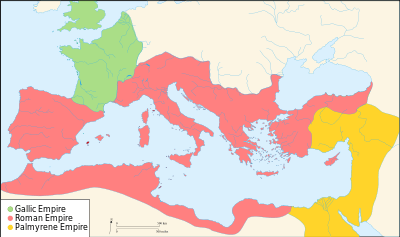271
| Millennium: | 1st millennium |
|---|---|
| Centuries: | 2nd century · 3rd century · 4th century |
| Decades: | 240s · 250s · 260s · 270s · 280s · 290s · 300s |
| Years: | 268 · 269 · 270 · 271 · 272 · 273 · 274 |
Year 271 (CCLXXI) was a common year starting on Sunday (link will display the full calendar) of the Julian calendar. At the time, it was known as the Year of the Consulship of Aurelianus and Bassus (or, less frequently, year 1024 Ab urbe condita). The denomination 271 for this year has been used since the early medieval period, when the Anno Domini calendar era became the prevalent method in Europe for naming years.
Events
By place
Roman Empire
- Emperor Aurelian pushes the Vandals back from Pannonia and forces them to withdraw over the Danube. He withdraws the Roman army from Dacia (modern Romania). (Note: This may have lasted until 272. Both years are mentioned by various sources.)
- January
- Battle of Placentia: The Juthungi[1] invade Italy and sack the city of Piacenza. A Roman army (15,000 men) under Emperor Aurelian is ambushed and defeated.
- Battle of Fano: The Juthungi move towards a defenceless Rome. Aurelian rallies his men and defeats the Germanic tribes on the Metauro River, just inland of Fano.
- Battle of Pavia: The Roman army pursues the Alamanni in Lombardy. Aurelian closes the passes in the Alps and encircles the invaders near Pavia. The Alamanni are destroyed and Aurelian receives the title Germanicus Maximus.
- Felicissimus, financial minister of the state treasury, leads an uprising of mint workers against Aurelian. He is defeated and killed on the Caelian Hill.
- Aurelian begins construction of a new defensive wall to protect Rome. The Aurelian Walls, 19 kilometers (12 mi), enclose the city with fortifications.
Europe
- Victorinus, Emperor of the Gallic Empire, is assassinated by Attitianus, reportedly for reasons of personal revenge. Domitianus presumably serves as Emperor for a few days before being replaced by Tetricus I.
Syria
- Zenobia proclaims herself to be Empress, and breaks all relations with the Roman Empire.
- Zenobia gives her son Vaballathus the title of Augustus.
By topic
Arts and sciences
- King Shapur I builds the Academy of Gundishapur (Iran), which becomes the intellectual center of the Sassanid Empire. The Nestorians fleeing religious persecution seek his protection. He commissions the refugees to translate Greek and Syriac works on astronomy, medicine and philosophy.
- A magnetic compass is first used in China.
Births
- Sima Wei, prince during the Jin Dynasty (d. 291)
Deaths
- Ding Feng, general of the Kingdom of Wu
- Domitianus, Emperor of the Gallic Empire
- Felicissimus, Roman financial minister (rationalis)
- Liu Shan, last Emperor of the Kingdom of Shu (b. 207)
- Pei Xiu, minister and cartographer of the Kingdom of Wei (b. 224)
- Sima Wang, general of the Jin Dynasty (b. 205)
- Victorinus, Emperor of the Gallic Empire
References
- ↑ Watson, Alaric. Aurelian and the Third Century. London, United Kingdom: Routledge, 1999, p. 50.
This article is issued from Wikipedia - version of the 8/2/2016. The text is available under the Creative Commons Attribution/Share Alike but additional terms may apply for the media files.
